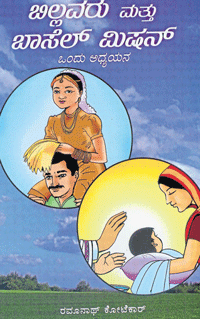‘Billavaru Mathu Basel Mission-Ondu Adhyayana’ (Billavas and Basel Mission-A study) is the debut book of city based businessman Ramanath Kotekar.

The book, which speaks of the various activities of the Basel Missionaries, takes a peep into the age when caste system was still rigid and the suppression of people on the basis of birth was rampant. The book beautifully taps the emotions of the Billava Community (who largely embraced Protestantism) of the region, their search for equality, their aspiration for better status in the society, their quest to break open the tentacles of caste system and finally all of these leading them to embrace a religion, which stood contradictory to the religion that they were born in.
Citing some of the examples of the initial conversions, the author says that despite having worked on the book for 10 long years, the question as to what might have had made so many Billavas (some of whom had better social standing and land holding too) embrace Protestantism is a mystery.
“The most fascinating point here is that, of every 10 who got converted by the Basel Missionaries way back in 1850s, nine were Billavas. Again, among the Billavas, some were the main priests at the renowned Daivasthanas, or those who had huge land holdings and social standing.
It often baffles me to understand what was the persuasion, which made them give up a strong cultural background and accept a new religion,” says the author adding that despite the land holding and the status attached to certain Billava families because of the worship system of the soil, Billavas largely had been deprived of education and equality and the author comes to the conclusion that it was probably the yearning for education for the younger generation and pursuit of better employment and status that must have made the Billavas reject their own customs and religion.
“This is evident in certain cases where a priest of a renowned Daivasthana embraces Protestantism fighting against his own family, entire society and all odds. Further, help from missionaries to solve innate problems at the household level could have made a certain section to see that it was better to accept what is modern and liberal rather than suffocating in what is traditional and rigid,” said Kotekar.
Rejecting Daivas
In pursuit of happiness, some of the renowned Billavas family names like Amin became Aimon, Ammanna Bannaya became Ammanna, Karkera became Karkada, Salian became Salins, Mabian became Maben, Suvarna became Soans and Uppen became Uppenna.
Kotekar says that one more strong reason for Billavas to embrace the new option was the sheer disappointment over the Daivas.
“Billavas were necessarily agriculturists and the ones who fiercely believed the Daivas. The community held Daivas responsible for all good and bad happening to them. When they were subjected to injustice or whenever they were posed to difficulties, they held Daiva responsible for the same. Somewhere the Billavas had been so dejected by the entire system of worshipping the Daivas that they wanted to breakout of this. They had only two options, either to accept the Brahma Samaj or the Basel Mission. Here the Billavas opted for Basel Mission because of the accessibility to the missionaries and the series of social reformations that they had evidently brought in,” Kotekar said adding that there is an episode where a Billava loses both of his cattle and then in despair he declares: ‘I will never worship the Daiva again for all the pains Daiva has given me.’
The author says that the fact that at many places the ‘Garadis’ were transformed into prayer halls, stand as a talking example for the same.
The change in the social status and lifestyle of those who had got converted might have had prompted many more to accept Protestantism.
Benet Ammanna of Karnataka Theological College and the fifth generation of Ammanna Bannaya lineage of Pangala Gudde Garadi (Annu Poojary of this family got converted in 1851) says that the book lays foundation for several possible future studies in the same area. He says that while the Billavas rejected most of the beliefs and customs attached to the mother religion, they carried forward the caste based occupation- traditional system of medicine.
“Even today, there are several converted families which give ayurvedic medicines, which they had learnt from their ancestors,” says Ammanna.
Kotekar’s second book named ‘Study on Billavas’ is in printing stage and will be out in March or April. Meanwhile, this book will be released on February 28 at KTC hall.